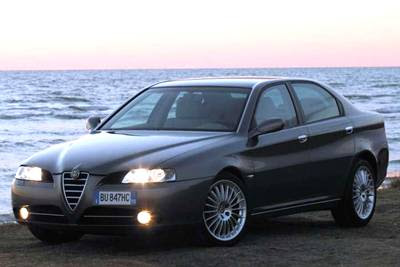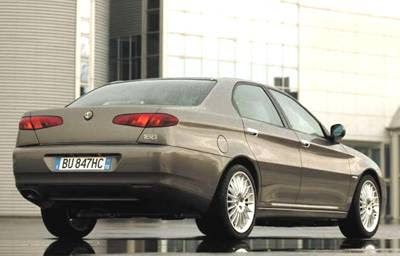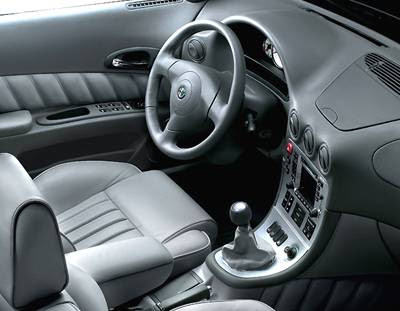2004 Alfa Romeo 166

Alfa Romeo 166
Changes in the body of the Alfa Romeo 166 are the work of the Alfa Romeo Style Center, which has combined the Giugiaro design for the new 156 with some features of the 147.

Alfa Romeo 166
The outline of the headlights, air intakes beside them and the central part of the grid are similar to those of 156. The arrangement of the lower air intake, split into two, is similar to the 147. The back virtually unchanged. Inside the changing selection of coating materials and combinations of colors available.

Alfa Romeo 166
It is marketed with levels of equipment 'Progression' and 'Distinctive'. Distinctive are the alloy wheels of 17 inches (225 tires), leather seats, heated and electric charger and six records.

Alfa Romeo 166
Option will be available for all versions of package equipment "IT" which is a less flexible suspension and springs that make the body closer to the ground, as well as wheels 18 inches in diameter (235/40-18).

Alfa Romeo 166
The interior features of the Alfa Romeo 166 black leather seats, stirrups marked with the distinctive 'IT', and red illumination of switches and instrument panel. This equipment is available for all versions of the Alfa Romeo 166.

Alfa Romeo 166
The range has two solid colors (black and red Alfa Kyalami), eight and a metallic iridescent. According to the version of equipment (Progression and Distinctive), the dashboard can be colored black, beige or gray, with two tones. There are three colors of leather upholstery (black, gray or beige), including the seats, doors and dashboard.

Alfa Romeo 166
The changes in equipment are light. The dual headlights are now xenon (optional) and curtain airbags protect both the occupants and deployed quickly. There is also an automatic locking of the door (from outside the car) and the trunk to exceed 20 km / h speed. Standard cassette and radio controls are integrated into the steering wheel.

Alfa Romeo 166
There are range of four petrol engines and two Diesel. All gasoline is indirect injection. Initially not used in Alfa Romeo 166 JTS 2.0 engine (165 hp) that it has the 156 in place maintains the 2.0 TS (150 HP).

Alfa Romeo 166
The other options are the 2.5 V6 petrol (which gives 188 hp instead of 192 hp from the Alfa 156) and 3.2 V6, which has 240 hp (same as the GTV) instead of the 220 model that derives (3.0 V6).
Alfa Romeo 166
Diesel engines are not in four-cylinder, five of them. The Alfa Romeo 166 2.4 JTD maintains ten valves and added to supply the 2.4 Multijet 175 HP and twenty valves. The latter is characterized by an injection system that has provided various sequences, with four shots at most, depending on load and engine speed.
Alfa Romeo 166
The petrol versions of Alfa Romeo 166 have no change in the engine (2.0 and 2.5 V6 24V TS), maintain the same consumption data and benefits as previous models, although they now have a box six-speed gears instead of five. Diesel 150 hp is still using a box of six gears and now consume on average 7.2 liters instead of 7.5. The Alfa Romeo 166 2.4 JTD 175 hp can have a stick shift five-speed automatic made by Aisin.
Alfa Romeo 166
The new version of 3.2 liters is distinguished from competition by high consumption and is not better than the average. The 2.4 JTD has a capacity of consumption and acceleration similar to that of its rivals
Alfa Romeo 166
Three years after the launch of the common duct system Unijet, Fiat has announced a new generation of this system: the Multijet. Structurally it is very similar to the original Unijet, and goes one step further on the idea of fragmenting the injection in several stages. In this case, and depending on the conditions under which the vehicle is in motion, the number of injections per cycle of work can amount to five.
Alfa Romeo 166
This will get an even smoother combustion, resulting in less engine noise (especially in one of the largest cold disadvantages of direct injection diesel) and, above all, in some pollutant emissions well below current levels, This will allow Fiat to meet the new standard Euro4 without the aid of catalytic oxidation. I.e., without costly and complex systems such as particle filter. Fiat announced a reduction of pollutant emissions at around 35%.
Alfa Romeo 166
In emissions is where the main advantage of Multijet, Fiat has not focused its design toward better performance. To meet its objectives, Fiat sufficient to maintain the injection pressure at 1350 bar, with the same operating current Unijet. According to Fiat, the maximum pressure should be the minimum necessary to meet the requirements of the engine; increased pressure is not a value in itself.
Alfa Romeo 166
The commercial release of this new technology will occur with the advent in 2003 of a Fiat Punto with an engine displacement of 1.2 liters, four cylinders, 16 valves and 70 HP. By the time Fiat already has prototypes with the same engine and an evolution of the current four-cylinder engine and 1.9 liter








No comments:
Post a Comment